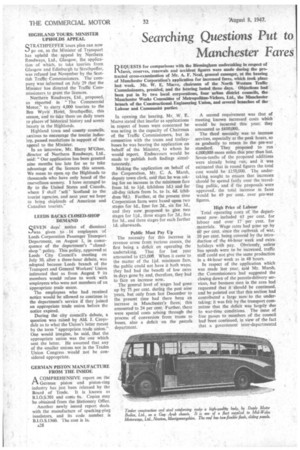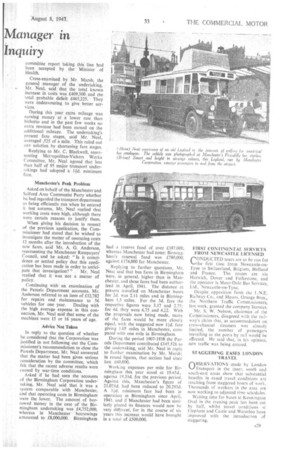Searching Questions Put to Manchester Fares
Page 30

Page 31

If you've noticed an error in this article please click here to report it so we can fix it.
'Manager in Inquiry
REQUESTS for comparisons with the Birmingham undertaking in respect of fares, reserves, renewals and accident figures were made during the protracted cross-examination of Mr. A. F. Neat, general manager, at the hearing of Manchester Corporation's application for increased fares, which took place last week. Mr. W. E. Macre, chairman of the North Western Traffic Commissioners, presided, and the hearing lasted three days. Objections had been put in by two local corporations, four urban district councils, the Manchester Works Committee of Metropolitan-Viekers, Ltd., the Manchester branch of the Constructional Engineering Union, and several branches of the Labour and Communist parties.
In opening the hearing, Mr. W. E. Macve stated that insofar as applications in respect of buses were concerned he was acting in the capacity of Chairman of the Traffic Commissioners, but in connection with the trams and trolleybuses he was hearing the application on behalf of the Minister, to whom he would report. Endeavours would be made to publish both findings simultaneously.
Making the application on behalf of the Corporation, Mr. C. A. Marsh, deputy town clerk, said that he was asking for an increase in the minimum fare from Id. to 1.0. (children Id.) and for all-day tickets from is. to Is. 6d. (children, 9d.). Further, at the present time Corporation fares were based upon two stages for Id., four for 2d., six for 3d., and they now proposed to give two stages for ltd., three stages for 2d., five for 3d., and three stages for each further 1cL afterwards.
Public Must Pay Up The necessity for this increase in revenue arose from various causes, the first being a deficit on operating the undertaking. That for last year amounted to £23,006. When it came to the matter of the 1-id. minimum fare, the public could not have it both ways; they had had the benefit of low rates in days gone by and, therefore, they had to face an increase now.
The general level of wages had gone up by 75 per cent, during the past nine years, but only from last December to the present time had there been an increase in Manchester's fares; this amounted to 24 per cent. Further, there were special costs arising through the process of conversion from trams to buses, also a deficit on the parcels department. A second requirement was that of meeting known increased costs which would be incurred this year; they amounted so £410000.
The third necessity was to increase services, especially at the peak hours, so as gradually to return to the pre-war standard. They proposed to run 4,000,000 more miles this year than last. Seven-tenths of the proposed additions were already being run, and it was estimated that in round figures the total cost would be £150,000. The undertaking sought to ensure that increases should be spread fairly over the travelling public, and If the proposals were approved, the total increase in fares would be 49 per cent. over pre-war figures.
High Price of Labour Total operating costs of the department now included 63 per cent, for labour and over 17 -per cent, for materials. Wage rates had gone up by 60 per cent. since the outbreak of war, 10 per cent. being covered by the introduction of the 44-hour week and extra holidays with pay. Obviously, unless bus speeds were to be increased, traffic staff could not give the same production in a 44-hour week as in 48 hours.
In respect of the application which was made last year, said Mr. Marsh, the Commissioners had suggested the closing down of the parcels-delivery services, but business men in the area had requested that it should be continued, and he pointed out that this section had contributed a large sum to the undertaking; it was felt by the transport committee that the deficit was largely due to war-time conditions. Theissue of free passes to members of the council had been continued, in view of thefact that a government inter-departmental committee report taking this line had been accepted by the Minister of Health.
Cross-examined by Mr. Marsh, the general manager of the undertaking, Mr. Neal, said that the total known increase in costs was £409300 and the total probable deficit £465,225. They were endeavouring to give better services.
During this year extra mileage was earning money at a lower rate than hitherto and in the past few weeks no extra revenue had been earned on the additional mileaee. The undertaking's present fare stages, said Mr. Neal, averaged .525 of a mile. This ruled out any solution by shortening fare stages.
Replying to Mr. C. Blackwell, representing Metropolitan-Vickers Works Committee, Mr. Neal agreed that less than half of 95 major transport undertakings had adopted a lid. minimum fare.
.Manchester's Peak Problem
Asked on behalf of the Manchester and Salford Area Communist Party whether he had regarded the transport department as being efficiently run when he entered it last autumn, Mr. Neal replied that working costs were high, although there were certain reasons to justify them.
When giving his decision in respect of the previous application, the Commissioner had stated that he wished to investigate the matter of operating costs 12 months after the introduction of the new fares, said Mr. A. G. Anderson, representing the Manchester Ratepayers' Council, and he asked: "Is it coincidence or settled policy that this application has been made in order to antici pate that investigation?" Mr. Neal replied that it was not a matter of policy.
Continuing with an examination of the Parcel.: Department accounts. Mr. Anderson referred to an item of £12,782 for repairs and maintenance to 56 vehicles for one year. Dealing with the high average expense in this connection, Mr. Neal said that some of the machines were 15 or 16 years of age.
Advice Not Taken In reply to the question of whether he considered that the Corporation was justified in not following out the Commissioner's recommendation to close the Parcels Department, Mr. Neal answered that the matter had been given serious consideration by the committee, which felt that the recent adverse results were caused by war-time conditions.
Asked if he had seen the accounts of the Birmingham Corporation undertaking, Mr. Neal said that it was a system comparable with Manchester, and that operating costs in Birmingham were the lower. The amount of borrowed money in the case of the Birmingham undertaking was £4,752,000, whereas in Manchester borrowings amounted to £8,000,000. Birmingham
had a reserve fund of over £187,000, whereas Manchester had none; Birmingham's renewal fund was 1780;000, against £174,000 for Manchester.
Replying to further questions, Mr. Neal said that bus fares in Birmingham were, in general, higher than in Manchester, and these fares had been authorized in April, 1941. The distance at present travelled on Manchester buses for 2d. was 2.11 miles and in Birmingham 1.5 miles. For the 3d. fare the respective figures were 3.17 and 2.75; for 4d. they were 6.75 and 4.22. With the proposals now being made, many of the fares would be more closely equal, with the suggested new I4d. fare giving 1.05 miles in Manchester, compared with one mile in Birmingham.
During the period 1907-1938 the Parcels Department contributed £.145,526 to the undertaking, said Mr. Neal in reply to further examination by Mr. Marsh; in round figures, that section had since lost £60,000.
Working expenses per mile for Birmingham this year stood at 19.45d., against 19.31d. for the previous period. Against this, Manchester's figure of 21.021d. had been reduced .to 20.293d. A lid, minimum fare had been in operation in Birmingham since April, 1941; and if Manchester had been similarly placed its finances would now be very different; for in the course of six years this increase would have brought in a total of £500,000.
FIRST CONTINENTAL SERVICES FROM NEWCASTLE LICENSED
CONDUCTED tours are to be run for the first time from Newcastle-onTyne to Switzerland, Belgium, Holland and France. The routes are via Harwich. Dover and Folkestone, and the operator is Moor-Dale Bus Services, Ltd., Newcastle-on-Tyne.
Despite opposition from the L.N.E. Railway Co., and Messrs. Orange Bros., the Northern Traffic Commissioners, last week, granted the company licences.
Mr. S. W. Nelson, chairman of the Commissioners, disagreed with the railway's claim that, as accommodation on cross-channel steamers was already limited, the number of passengers travelling to the ports by rail would be affected. He said that, in his opinion, new traffic was being created.
STAGGERING EASES LONDON TRAVEL
.OSERVATiONS made by London Transport in the inner, south and south-east areas show that substantial benefits in eased travel conditions are resulting from staggered hours of work. Thousands of workers in the area are now working to adjusted time schedules.
Waiting time for buses at Kennington Oval in the evening peak has been cut by half, whilst travel conditions at Elephant and Castle and Waterloo have improved with the introduction of staggering.












































































